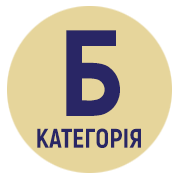PEDAGOGICAL HERITAGE OF VASYL SUKHOMLYNTSKYI AS A CONCEPTUAL BASIS OF THE PERSONALITY-ORIENTED LEARNING IN THE SYSTEM OF THE INCLUSIVE EDUCATION
DOI:
https://doi.org/10.32782/3041-1351/2024-2-15Keywords:
teacher, teacher-innovator, difficult children, person-centered learning, inclusive education, Pavlyska secondary school, parent school, teaching staff, psychological and pedagogical supportAbstract
Introduction. The article reveals the main models of the development of inclusive education based on a person-centered approach in the practice of the Pavlyska secondary school. The purpose of the article is to scientifically substantiate the conceptual provisions defined by V. Sukhomlynskyi, regarding personally oriented learning in the system of inclusive education. Scientific novelty of the article. The authors substantiates the relevance of using the innovative experience of an outstanding teacher in inclusive classes of secondary education institutions, to whom a significant number of scientific-pedagogical and artisticjournalistic works are dedicated. The main place in his works is occupied by the issues to which the teacher-practitioner attached special importance: how to teach children who find it difficult to assimilate educational material in a mass comprehensive school; what measures should be taken to ensure that children with disabilities are in the atmosphere of a full life of the school team; causes of mental retardation in children; work with parents raising such children; organization of psychological and pedagogical education with such parents. It is important to notice – every child need intensive mental work, accessable means of the overcoming of difficulties, involvement to the interesting work for the intellectual development, feel richness of the native language. Results. The main directions of Vasyl Sukhomlynskyi’s activity as a scientist and teacher-innovator on the introduction of the methodology of protective education in order to provide psychological and pedagogical support to students who find it difficult to learn, the principle of predictable success for such students, equal access to general education for children with special educational needs are analyzed. The tasks that need to be implemented when working with this category of children are defined, in particular, the influence of the functions of fiction on the formation of the student’s personality, the importance of reading for the correction and development of difficult children, the development of their speech, thinking, and emotional sphere. The main conceptual provisions that have become the basis of modern inclusive education and person-centered learning have been identified.
References
Сухомлинський В.О. Духовний світ школяра. Вибрані твори: у п’яти томах. Том 1. Київ, 1976. С. 209–637.
Сухомлинський В.О. Людина неповторна. Вибрані твори: у п’яти томах. Том 5. Київ, 1977. С. 80–96.
Сухомлинський В.О. Найвідсталіший у класі. Вибрані твори: у п’яти томах. Том 5. Київ, 1977. С. 584–590.
Сухомлинський В.О. Народження громадянина. Вибрані твори: у п’яти томах. Том 3. Київ, 1977. С. 283–657.
Сухомлинський В.О. Проблема виховання всебічно розвиненої особистості. Вибрані твори: у п’яти томах. Том 1. Київ, 1976. С. 55–206.
Сухомлинський В.О. Розмова з молодим директором школи. Вибрані твори: у п’яти томах. Том 4. Київ, 1977. С. 393–626.
Сухомлинський В.О. Сто порад учителеві. Вибрані твори: у п’яти томах. Том 2. Київ, 1976. С. 419–654.




